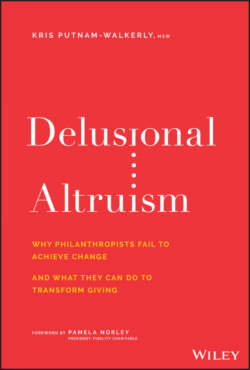Читать книгу Delusional Altruism - Kris Putnam-Walkerly - Страница 20
How Do You Know If You Have a Scarcity Mind-Set?
ОглавлениеDo you suffer from a scarcity mind-set? Don't take this personally, but chances are high that you do. I do, too. We all experience this at some point. I commonly see eight warning signs among philanthropists.
Take this eight-question Scarcity Mind-Set Quiz and see if a scarcity mentality might be holding you back. Give yourself a point for each question you answer affirmatively:
1 You frequently ask, “What's the cheapest way we can do this?” regardless of impact on quality, speed, or your discomfort. For example, you'll take a red-eye flight home to save money on hotel costs, even though it means you are exhausted and unproductive the next day.
2 You don't regularly make investments in your talent and infrastructure, or that of your grantees. This might include getting professional development or coaching, upgrading computer systems, attending conferences, evaluating your impact, etc.
3 Your workplace culture values working harder, not smarter. For example, people are expected to work late hours or on weekends, long meetings are the norm, and there are always lengthy processes for strategic planning or budgeting.
4 You hold a belief that every dollar you raise should go to the people and communities in need. You feel guilty investing in yourself.
5 You believe the real problems you want to tackle are impossible to solve with your funding. Instead of figuring out how to leverage your funding for outsized impact, you choose smaller, easier-to-solve problems. You often fund projects that eradicate the symptoms and not the cause.
6 You know something is critical to the success of your endeavor (e.g., a communications plan, developing partnerships, taking time off), but you never feel you have the time or resources to obtain it, do it, or fund it.
7 You don't invest in the people who could help you navigate your philanthropic journey, avoid mistakes, or save time. These could be trusted advisors, professional services (e.g., attorneys, accountants, donor-advised fund sponsors), content experts, consultants, or administrative support professionals.
8 You or your staff feel you don't have time to regularly think, plan, or build relationships because you're always too busy.
How did you do?
Let's first look at the worst-case scenario. If you scored 6–8, you need an intervention. You might even need therapy! In all seriousness, with a score like that, I'd wager that a scarcity mind-set is holding your philanthropy hostage. You could have greater impact, but you thwart yourself at every turn. But don't panic. Remember, a scarcity mind-set is just that—a mind-set. It's your beliefs. Beliefs can be changed. And just as in Alcoholics Anonymous, the first step is to admit you have a problem.
If you scored 3–5, your scarcity mind-set is certainly holding you back, but it's not strangling you. At least, not yet. Take a good look at the statements to which you answered “no.” If you embrace an abundance mind-set for those questions, think about how you can transfer that abundance mind-set to all aspects of your giving. (I will tell you more about an abundance mind-set in Chapter 9, “You See and Act Abundantly”).
If you answered “yes” to only one or two statements, you are in pretty good shape. But take a hard look at those statements. What's holding you back? Why do you feel scarcity in those areas? What investments in time or resources could unleash your effectiveness?
Now, if you scored a zero, you're likely in denial! Reread this chapter and open yourself up to the possibility that you are holding yourself back in some area of your work or life. In my entire professional career, I can only think of one person who genuinely, consistently, and in all aspects of his life could answer “no” to all of these questions.
Now, if you do truly feel that none of this applies to you, email me at kris@putnam-consulting.com and let me know how you do it! Seriously, I'd love to hear from you.
